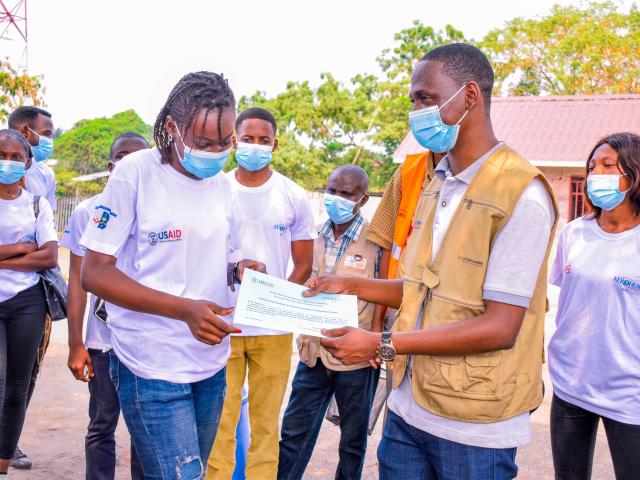
A few months after the One Health Workforce – Next Generation (OHW-NG) project launched in 2019, the gravity of the COVID-19 crisis began to hit, as lockdowns spread across the globe. A global collaborative, transdisciplinary, and multisectoral public health initiative, OHW-NG was created to bring public health professionals and researchers around the world together to focus on the interconnection of the health of animals, people, and the environment. The COVID-19 pandemic was a striking example of why a program like OHW-NG is critically needed: to ensure scientific communication between and among professionals across the world, who can help prevent and manage such spread of a dangerous virus. The pandemic highlighted the urgency to create connections across disciplines, sectors, and countries.
Working with university partners in Africa One Health University Network (AFROHUN) and Southeast Asia One Health University Network (SEAOHUN) around the world, over 50,000 people across Africa and Southeast Asia have participated in One Health training activities focused on global health security topics. “Many are faculty who can now train others at their universities and in their communities,” says Woutrina Smith, DVM, MPVM, PhD, an Associate Dean of the UC Davis School of Veterinary Medicine who has been leading OHW-NG’s work since its inception. “Student One Health Innovation Clubs have been created in most countries and harness the enthusiasm and energy of university students to get involved.” This has been an essential component to creating a connected network to center global health security.
“One of the OHW-NG project’s accomplishments is the One Health Workforce Academies (OHWA), with a goal is to bring the global health security workforce up to speed and to become competent in cross-disciplinary work that cuts across the animal health, human health and ecosystem,” says Oladele Ogunseitan, MPH, PhD, UCGHI Global Health Education Director. “The way we approach that is to establish certain competency domains. So, somebody who is a veterinary doctor or a pediatrician or an environmental scientist working in the area of health, can come together to understand one another and their fields, and to refine the task for presenting what we think of as spillover events of pathogens, from animal populations to human populations, and vice versa. Together they understand how to control the environmental mediators of spillover events.” The COVID-19 pandemic is an example of that kind of spillover event.
OHWA’s work fits into the One Health definition created in December 2021 by the United Nation’s agencies’ One Health High-Level Expert Panel (OHHLEP) which is “an integrated, unifying approach that aims to sustainably balance and optimize the health of people, animals and ecosystems.” One Health recognizes that the health of humans, animals, and ecosystems are interdependent. OHW-NG OHWA brings that definition to life to connect those doing research with humans, animals, and ecosystems.
OHW-NG was just getting started to carry out its One Health mission when the COVID-19 pandemic shut down international travel, and so the program began to move what they had started with as in-person activities in Africa and Southeast Asia, to also utilize online formats. In some ways, the online approach created an opportunity for even greater connection and collaboration globally. OHW-NG OHWA is designed to make academic work more global by creating interconnections with other universities, other researchers, and other communities all over the world.
“One of the limitations of universities is that we need a broad bank of resources, and we can’t do it all,” says Dr. Ogunseitan. He notes that for example even in the UC system, there is only one school of veterinary medicine at UC Davis. “And so, the hope is that when we have a competent interprofessional workforce that understands One Health and they work collaboratively, we will be able to prevent disasters such as the COVID-19 pandemic.”
To do that, OHWA offers trainings through online courses, case studies, toolkits, facilitator guides, webinars, and other creative means to build competency. OHWA launched their training in early 2023 and now more than 90 countries are represented and over 4,000 people are participating in one or more of the courses. One Health in the World, Outbreak Investigation and Response, and Antimicrobial Resistance in One Health are some of the popular courses.
OHWA has a lot planned moving forward. They hope to offer a One Health certificate program for both pre-service and in-service trainees, and they are working to create an information-sharing platform where all ~110 participating universities can collaborate. The OHWA team continues to refine its work based on a needs assessment elicited from international stakeholders which was featured in a paper published in One Health Outlook. They found that more than 90% of respondents would seek a One Health competency-based certificate, showing the need for such a program.
While the initial five-year USAID funding is slated to end in September 2024 (with a potential extension year being explored), the One Health University Networks do not intend to stop what they are doing. They are “actively building new partnerships, writing new grants, and connecting with their communities to be the bridge between the front lines of global health security threats, such as outbreaks and climate change,” says Dr. Smith. “When university networks act as innovation hubs, they and their funders can catalyze global change.”
